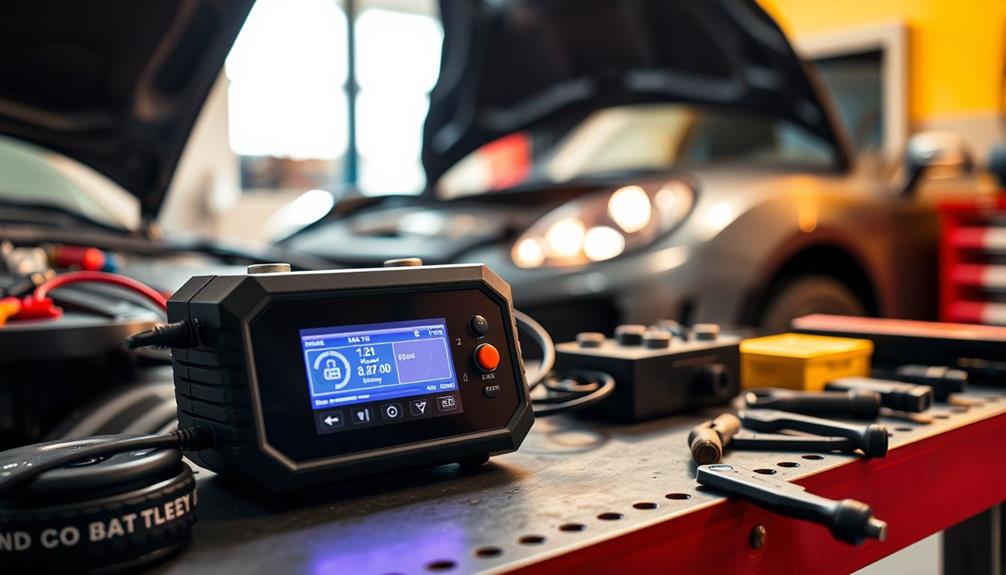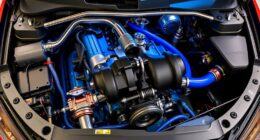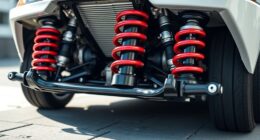Tuning your Nissan can greatly enhance its performance and driving experience. Start with basic modifications, like ECU remapping and air intake upgrades, to boost horsepower and torque. As you progress, consider more advanced options like turbocharger upgrades and custom builds for even greater gains. Keep an eye on essential parameters like air-fuel ratios and ignition timing for ideal results. Proper maintenance post-tuning is vital to guarantee longevity and efficiency. Each stage of tuning offers unique benefits, and understanding these can elevate your ride. There's so much more to explore, so stick around to uncover all the tuning secrets!
Key Takeaways
- Tuning enhances Nissan performance through modifications like ECU remapping, improving engine power, handling, and fuel economy.
- Stages of tuning range from basic air intake upgrades (Stage 1) to custom builds for racing (Stage 5).
- Proper tuning ensures predictable power delivery while maintaining engine longevity and preventing severe wear.
- Regular maintenance checks on components like fuel injectors and oil condition are crucial post-tuning for optimal performance.
- Selecting a reputable tuner is essential to achieve desired performance goals without risking vehicle damage.
Understanding Car Tuning
Understanding car tuning can seem intimidating at first, but it's all about enhancing your vehicle's performance to improve your driving experience.
Car tuning involves modifying key performance parameters, including engine power, handling, and fuel economy. The process starts with basic adjustments, like ECU remapping and improved air intake, which fall under Stage 1 tuning.
As you dive deeper, you can explore advanced options like turbocharger upgrades and custom builds.
To achieve peak performance, you'll need a solid grasp of engine parameters, particularly air-fuel ratios (AFR) and ignition timing.
These factors play an essential role in ensuring your engine runs efficiently and safely, avoiding any risk of damage.
Tuning Goals and Considerations
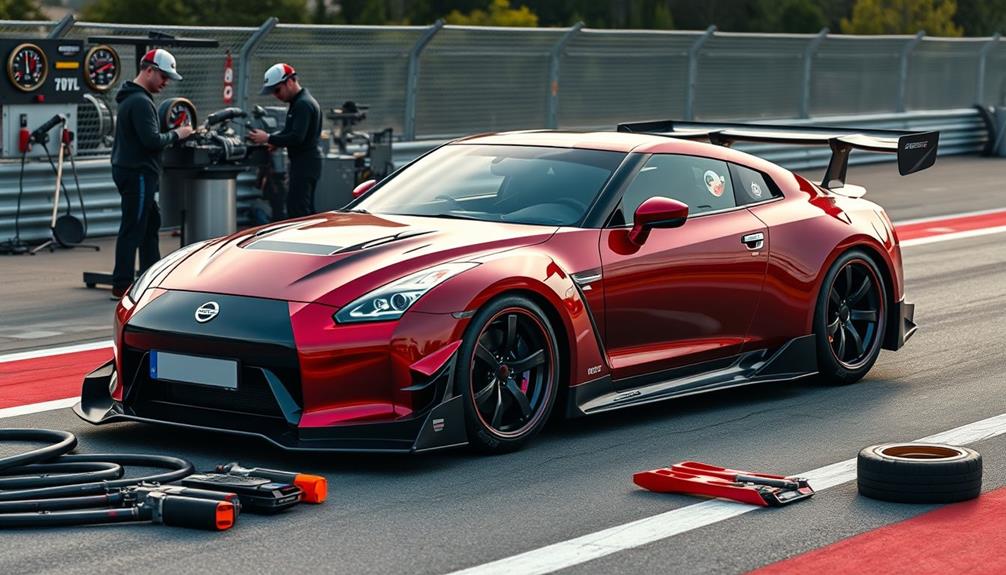
When tuning your Nissan, achieving predictable power delivery should be a top priority, as it greatly enhances your driving experience.
It's also essential to select a reputable tuner; this helps prevent engine damage and keeps your modifications within safe limits.
Predictable Power Delivery
Achieving predictable power delivery is essential for maximizing your Nissan's performance, especially during varied driving conditions. Proper tuning of your engine's parameters guarantees consistent power outputs, which is critical for a smooth and enjoyable driving experience.
When you manage boost levels effectively, you not only enhance overall performance but also prevent engine issues, particularly under heavy acceleration.
Consider these factors to guarantee predictable power delivery:
- You'll feel confident in your car's responsiveness.
- Enjoy a smoother ride across all terrains.
- Experience less wear on engine components.
- Achieve impressive performance without risking damage.
- Gain peace of mind knowing your tuning is dependable.
Being aware of your Nissan's factory limits during tuning helps maintain the balance between enhanced performance and engine longevity.
Continuous learning from your tuning experiences allows you to refine power delivery further, guaranteeing that your vehicle performs at its best in any situation.
Remember, working with a reputable tuner is essential—improper tuning can lead to complications that may compromise your ride.
Reputable Tuner Selection
Choosing the right tuner can make or break your Nissan's performance, especially after focusing on predictable power delivery. A reputable tuner is essential for achieving your performance goals without risking engine damage. They possess a deep understanding of factory limits and can help prevent premature wear on your engine components by ensuring that your modifications align with your car's capabilities.
When selecting a tuner, look for someone with a solid track record. This experience can provide you with valuable insights into the tuning process, including the specific features available with your chosen options. Engaging with a skilled tuner not only enhances your vehicle's performance but also gives you peace of mind about the quality of work being done.
Before making a decision, it's worth researching and consulting with recommended tuners. Gather feedback from fellow Nissan enthusiasts to clarify what to expect during the tuning process.
Stages of Tuning Modifications

Tuning your Nissan can be an exciting journey, as each stage of modifications offers unique benefits and performance enhancements. For example, starting with basic bolt-on modifications can improve horsepower and torque, while more advanced tuning and engine management systems can fine-tune your Nissan’s performance to your specific requirements. Whether you’re looking to enhance the handling and braking of your Nissan 370z or maximize its power output, there are countless aftermarket parts and tuning options available to customize your car to your preferences. Nissan 370z tuning can help you unleash the full potential of your vehicle and create a truly personalized driving experience.
Here's a quick overview of the stages you might consider:
- Stage 1: ECU remapping and air intake upgrades improve throttle response and deliver modest performance gains without major changes.
- Stage 2: Adding a turbocharger and upgraded camshafts greatly boosts horsepower and torque, often requiring modifications to your fuel system.
- Stage 3: With engine block enhancements and upgraded pistons, you'll see serious improvements in overall power and reliability, perfect for performance enthusiasts.
- Stage 4: Focused on racing, this stage features custom builds and extensive modifications for ideal speed and handling on the track.
- Stage 5: Reserved for the pros, this stage deals with track-ready enhancements like weight reduction and aerodynamic improvements, ensuring you're competitive in racing environments.
Each stage not only enhances your Nissan's capabilities but also deepens your connection to the vehicle.
Performance Benefits of Tuning

Many Nissan owners experience remarkable performance benefits after tuning their vehicles. One of the most significant upgrades you'll notice is an increase in horsepower and torque, with some modifications yielding gains of up to 30% or more. This boost in power enhances your driving experience, allowing for quicker acceleration and improved throttle response.
You'll find that your car reacts more promptly to your commands, making every drive feel exhilarating.
Tuning doesn't just focus on power; it can also optimize fuel efficiency. With the right adjustments to engine parameters, even smaller diesel engines can achieve better fuel savings, reducing your overall costs.
Additionally, performance tuning often includes upgrading suspension and handling components, which improves vehicle stability and cornering abilities, leading to a more enjoyable ride.
Another key benefit is increased reliability. When you optimize your engine parameters, you help prevent potential issues like overheating and engine knock. This not only enhances performance but also extends the lifespan of your vehicle.
Risks and Precautions
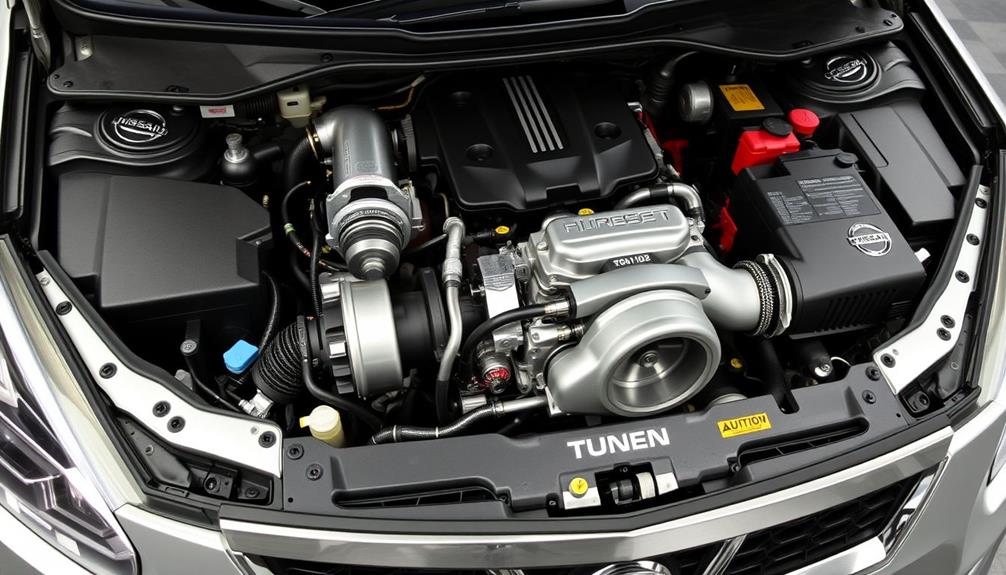
When it comes to tuning your Nissan, understanding the risks involved is essential for a successful upgrade. Improper tuning can lead to severe engine issues, including knocking and overheating, which can result in costly repairs and a shortened vehicle lifespan.
You should also be aware that performance modifications might accelerate wear on your components, leading to more frequent maintenance and replacements.
Consider these risks before diving into tuning:
- Engine damage could be financially devastating.
- Increased maintenance costs could strain your budget.
- Legal complications from emissions regulations might arise unexpectedly.
- Insurance coverage may not apply to high-performance usage.
- Professional installation is vital for safety and performance integrity.
Maintenance After Tuning

After tuning your Nissan, you need to keep a close eye on your components for any signs of wear.
Regularly monitoring your oil condition and tracking performance metrics will help you maintain peak function.
Staying proactive in these areas guarantees your car runs smoothly and safely on the road.
Regular Component Checks
To keep your Nissan running smoothly post-tuning, regular component checks are essential.
These checks guarantee your car maintains peak performance and responsiveness. By keeping up with routine inspections, you can prevent costly repairs and enjoy a thrilling driving experience.
- Regularly inspect your fuel injectors for leaks and verify proper pressure.
- Don't neglect your ignition timing; even slight adjustments can impact performance.
- Stay on top of oil changes to reduce wear and enhance engine longevity.
- Replace the fuel filter to keep contaminants out of your fuel system.
- Monitor your air-fuel ratio (AFR) to confirm efficiency and power output.
Oil Condition Monitoring
Maintaining your Nissan's performance goes beyond regular component checks; monitoring your oil condition is imperative, especially after tuning. Your driving style plays a significant role in how quickly your engine oil degrades. For instance, if you mostly engage in drag strip driving, oil degradation mightn't happen as rapidly as it would with circuit racing, where increased engine stress accelerates breakdown.
It's essential to perform oil changes based on your specific driving habits rather than sticking to a rigid schedule, particularly after proper tuning. This approach guarantees your engine oil remains effective in lubricating and protecting critical components.
Using high-quality synthetic oils can also enhance protection and performance in tuned vehicles, where the engine faces higher stresses.
Keep an eye on your oil's color, consistency, and smell; these indicators can reveal its condition and signal when it's time for a change. Regular oil condition monitoring not only helps maintain peak engine performance but can also improve fuel consumption, ensuring your Nissan runs efficiently on every drive.
Stay proactive about your oil, and you'll prolong the life of your engine while enjoying every moment behind the wheel.
Performance Metrics Tracking
Regularly tracking performance metrics like horsepower, torque, and fuel economy is vital after tuning your Nissan. This practice guarantees that your modifications are effective and that your engine performs at its best.
You'll want to keep an eye on data logs that include injector duty cycle, engine vacuum, and air-fuel ratio (AFR). These metrics help you spot tuning issues early and make adjustments as needed.
Consider these important elements for maintaining your tuned vehicle:
- Enhanced driving experience
- Increased horsepower and torque satisfaction
- Improved fuel economy that saves you money
- Greater reliability and longevity for your car
- Peace of mind knowing you're in control
Don't forget to maintain your fuel pressure regulator and schedule routine checks on your tuned components. Proper tuning requires ongoing monitoring to prevent premature wear and guarantee reliability.
Utilizing diagnostic tools to track engine parameters will help you detect any potential issues before they escalate. Documenting changes in your vehicle's performance metrics before and after tuning gives you valuable insights for future modifications, allowing you to continue enhancing your Nissan's performance.
Embrace this vital practice to enjoy a thrilling driving experience.
Fuel System Optimization

Optimizing your fuel system is vital for maximizing your Nissan's performance. A well-tuned fuel system guarantees your engine runs efficiently, delivering the power you crave. Start by checking your fuel pressure; it should typically remain between 40-60 PSI, depending on your vehicle's requirements. Upgrading to larger fuel injectors can improve fuel delivery by 10-30%, especially if your engine's modified.
Regular maintenance is key; replace your fuel filter every 15,000 to 30,000 miles to avoid clogging that restricts fuel flow. Additionally, consider installing a high-performance fuel pump to meet increased horsepower demands, as stock pumps may struggle under heavy loads.
Monitoring your air-fuel ratio (AFR) is also essential. Aim for an ideal AFR of around 12:1 at Wide Open Throttle (WOT) to guarantee efficient combustion and prevent engine knock.
Here's a quick reference table to help you remember these important factors:
| Component | Ideal Specs | Maintenance Interval |
|---|---|---|
| Fuel Pump | 40-60 PSI | As needed |
| Fuel Injectors | 10-30% larger | As needed |
| Fuel Filter | Clean | 15,000-30,000 miles |
| Air-Fuel Ratio | 12:1 at WOT | Monitor regularly |
Advanced Tuning Techniques

Advanced tuning techniques can greatly enhance your Nissan's performance, allowing you to access the full potential of your engine. By focusing on critical areas like the Air-Fuel Ratio (AFR) and timing adjustments, you can achieve significant gains in power and efficiency. For peak performance, aim for an idle AFR around 14.5:1 and a Wide Open Throttle (WOT) AFR of 12:1.
Utilizing standalone Engine Management Systems (EMS) gives you precise control over both fuel and timing maps. This lets you fine-tune your setup based on specific modifications and driving conditions.
Here are some benefits you can expect:
- Release raw power that turns heads
- Experience smoother acceleration and throttle response
- Maximize fuel efficiency while pushing your limits
- Prevent engine knock and improve longevity
- Enjoy real-time feedback for informed adjustments
Data logging key metrics, like injector duty cycle and engine vacuum, is essential for analyzing performance. Continuous monitoring and gradual adjustments will help prevent lean conditions or excessive boost, ensuring your tuned engine remains reliable and responsive.
With advanced tuning, you're not just enhancing performance—you're transforming your driving experience.
Frequently Asked Questions
How Much Horsepower Does Tuning Your Car Add?
Tuning your car can add significant horsepower, typically ranging from 10-30%. Basic modifications might boost it by 15-25 horsepower, while advanced tuning could exceed 100 horsepower, depending on your engine setup and modifications.
What Does Performance Tuning Do for a Car?
In this modern age of automotive enlightenment, performance tuning optimizes your car's engine parameters, enhancing horsepower and torque markedly. You'll enjoy improved fuel efficiency, responsiveness, and reliability, ensuring your vehicle performs at its peak.
Does ECU Tuning Make Your Car Faster?
Yes, ECU tuning makes your car faster by optimizing fuel injection and ignition timing. You'll experience improved horsepower, torque, and throttle response, leading to quicker acceleration and a more exhilarating driving experience overall.
Does Tuning up Your Car Make It Faster?
Some might think tuning's just a gimmick, but it actually boosts your car's speed. By optimizing fuel delivery and enhancing engine performance, tuning can greatly improve acceleration and overall responsiveness, making your ride much faster.
Conclusion
In the world of Nissan tuning, think of your car as a musical instrument. Just like a skilled musician fine-tunes their guitar for perfect harmony, you can enhance your ride's performance to create a symphony of speed and efficiency. But remember, every masterpiece requires careful handling. Treat your tuned Nissan with the respect it deserves, and it'll reward you with thrilling experiences on the road. Embrace the journey, and let your car sing its true potential!

